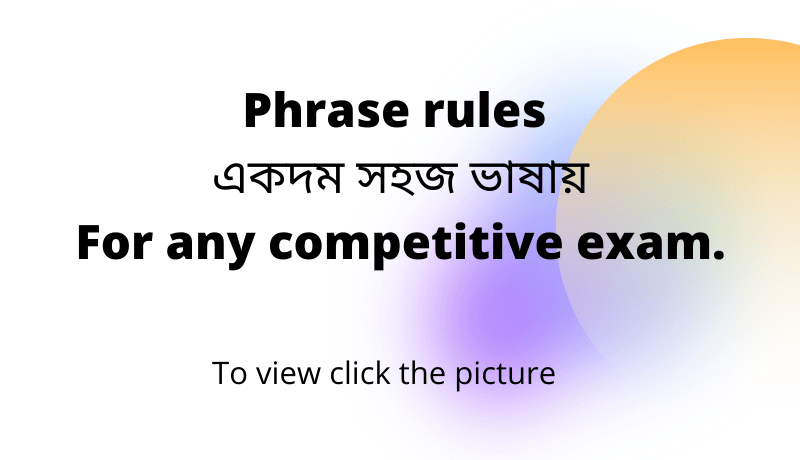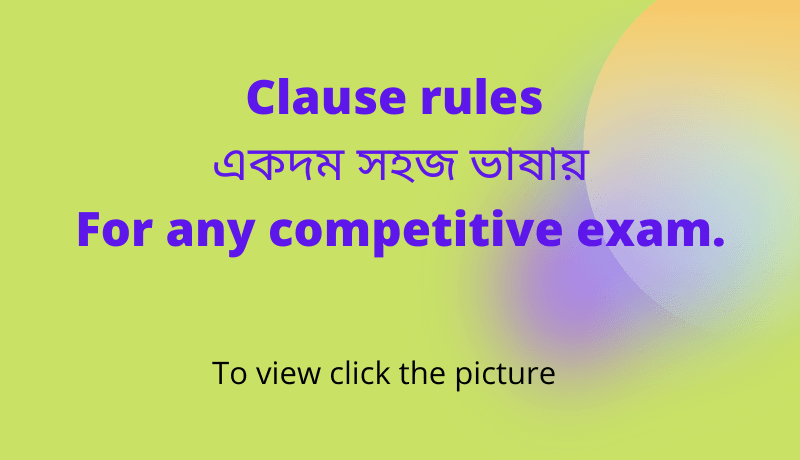( bangla phrase rules. ) কয়েকটি শব্দ মিলে একটি Phrase গঠিত হয়। Phrase এর Subject and verb থাকলেও finite verb থাকে না।
যেমন- The water being hot, I could not drink it. ১ম টি Phrase এবং ২য় টি clause.
Phrase শেখার আগে parts of speech শিখা উচিত । Click here.
- Parts of speech এ যেসব স্থানে noun, pronoun, verb, adverb, adjective, preposition, conjunction, interjection হয়। সেসব স্থানে noun phrase, pronoun phrase, verb phrase, adverb phrase, adjective phrase, preposition phrase, conjunction phrase, interjection phrase হবে।
* বাক্যে শব্দের অর্থ এবং অবস্থান অনুযায়ী Phrase নির্ণয় করতে হবে।
যেমন- He is a man of letters.
এখানে man of letters= scholar.
N.B. man of letters = লেখক এবং scholar= পন্ডিত বা লেখক। অতএব man of letters = scholar. আবার article বা determiner এর পরে noun বসে. তাই এটি Noun phrase.
* I am free from blame.
এখানে free from blame= blameless
যার অর্থ ‘দোষমুক্ত’। যেটি adjective. আবার be verb এর পরে adjective বসে। অতএব, free from blame হলো adjective phrase
*He worked with care.
এখানে with care= carefully. যার অর্থ ‘যত্নসহকারে’। যেটি adverb.
আবার verb এর পরে adverb বসে।
অতএব , with care হলো adverb phrase.
*He stood in front of me.
এখানে in front of = before.
যার অর্থ ‘পূর্বে বা সামনে’ । যেটি preposition.
২ পাশে preposition থাকলে সাধারণত preposition হয়।
অতএব, এটি preposition phrase.
উপরে আলোচিত ৪ টি phrase মূলত প্রধান। এছাড়াও আরো কিছু phrase নিয়ে নিম্নে আলোচনা করা হলো।–
Phrase ৯ প্রকার।
1. Noun phrase
2. Adjective phrase
3. Adverbial phrase
4. Verb phrase
5. Preposition phrase
6. Conjunction phrase
7. Interjection phrase
8. Infinitive phrase
9. Participle phrase
1. Noun phrase
Parts of speech এ যেসব জায়গায় Noun বসে, Phrase এর ক্ষেত্রে ঠিক সেসব জায়গায় noun phrase হয়।
* Verb এর Subject হিসেবে Noun phrase হয়।
Example :
To read newspaper is a good habit.
a) Noun phrase* b) Adjective phrase
c) Adverbial phrase d) verb phrase
N.B এখানে is হলো verb. যার subject অংশটুকু Noun phrase.
* Transitive Verb এর Object হিসেবে Noun phrase হয়।
Example :
The man wants something to eat.
a) Noun phrase * b)Verb phrase
c) Adjective phrase
d) Adverbial phrase
N.B. এখানে want হলো transitive verb. কারন want এর পরে it বসালে অর্থ ঠিক থাকে। যেমনঃ the man want it. তাই want (verb)এর object হিসেবে noun phrase হয়েছে ।
* Complement হিসেবে Noun phrase হয়।
*Subject complement হিসেবে-
example :
He is a man of letters.
a) Adjective phrase b) Verb phrase
c) Noun phrase * d) Adverbial phrase
N.B. এখানে He এবং man of letters একই ব্যক্তিকে বোঝায় তাই verb এর পরের অংশটি subject complement হিসেবে Noun phrase.
* Object complement হিসেবে-
Example :
We elected Rafi captain of our class.
a) Adverbial phrase b) verb phrase
c) Noun phrase * d) Adjective phrase
N.B. এখানে Rafi এবং ক্লাসের ক্যাপ্টেন একই ব্যক্তি। তাই Rafi এর পরের অংশটুকু Object complement হিসেবে Noun phrase.
*Appositive হিসেবে –
Example :
Rahim, the cricketer in our class is a gentle boy.
a) Adverbial phrase b) verb phrase
c) Noun phrase * d) Adjective phrase
N.B. Noun এর পরে বসে Noun সম্পর্কে অতিরিক্ত তথ্য দিলে সেটা appositive হয়। এখানে রহিম এবং ক্লাসের ক্রিকেটার একই ব্যক্তি। তাই এটি appositive হিসেবে Noun phrase.
*Preposition এর Object হিসেবে Noun phrase হয়।
Example :
He came to ‘our house’.
a)Noun phrase * b)Adjective phrase
c) Verb phrase d)adverb phrase
N.B. এখানে preposition এর object হিসেবে ‘our house ‘ Noun phrase হয়েছে।
2. Adjective phrase
parts of speech অনুযায়ী যেসব জায়গায় adjective বসে, phrase এর ক্ষেত্রে ঠিক সেসব জায়গায় adjective phrase বসে। এই phrase টি noun এর আগে অথবা পরে বসে noun কে modify করে।
সাধারণত noun এর পরে preposition বা particle দ্বারা শুরু phrase টি adjective phrase হয়।
example :
A thing of beauty is a joy forever.
a)Noun phrase b)Adjective phrase*
c) Verb phrase d)adverb phrase
N.B. এখানে A thing হলো noun. আর ‘of beauty’ শব্দটি noun এর পরে বসার কারনে adjective phrase.
There is no hard and fast rule in film marketing.
a)Noun phrase b)Adjective phrase*
c) Verb phrase d)adverb phrase
N.B. এখানে No হলো determiner. আর Rule হলো noun. Determiner এবং noun এর মাঝে adjective phrase বসে।
The scientist doing the research in the Laboratory is my cousin.
a)Noun phrase b)Adjective phrase*
c) Verb phrase d)adverb phrase
N.B. এখানে the scientist হলো noun. আর doing হলো participle. Doing+বাকি শব্দগুলো noun এর পরে বসে noun কে modify করার কারনে তা adjective phrase . bangla phrase
3. Verbal phrase
যে phrase – verb এর কাজ করে তাকে verbal phrase বলে।
example :
We look for brilliant students.
a)Noun phrase b)Adjective phrase
c) Verbal phrase * d)adverb phrase
N.B: এখানে look for হলো verb. যার অর্থ খোঁজা বা সন্ধান করা।
4. Adverbial phrase
parts of speech a যেসব জায়গায় adverb বসে, phrase এর ক্ষেত্রে সেসব জায়গায় adverbial phrase হবে। verb কে how (কিভাবে), Where (কোথায়), when (কখন), why (কেন) দ্বারা প্রশ্ন করে উত্তর পাওয়া গেলে সেটা adverbial phrase হবে। bangla phrase
I worked on it without any protest. (আমি নির্বিঘ্নে কাজ চালিয়ে গেলাম)।
a) Noun phrase b) Verbal phrase
c) Adverbial phrase * d) Adjective phrase
N.B. এখানে verb (work) কে how দ্বারা প্রশ্ন করা যায়।
He is in the room.(সে ঘরের মধ্যে আছে)
a) Noun phrase b) Verbal phrase
c) Adverbial phrase * d) Adjective phrase
N.B. এখানে verb (is) কে Where দ্বারা প্রশ্ন করা যায়।
5. Prepositional phrase
যে phrase কাজ করে preposition এর মতো তাকে preposition phrase বলে। যে শব্দগুচ্ছের শুরুতে এবং শেষে preposition থাকে সেটি preposition phrase হয়। preposition যুক্ত শব্দগুচ্ছ যদি কোন একক preposition দ্বারা প্রতিস্থাপন করা যায় তবে সেটা preposition phrase হয়।
He stood in front of me.
a) Noun phrase b) Verbal phrase
c) preposition phrase * d) Adjective phrase
N.B. in front of me= সামনে বা পূর্বে।
আবার, before = সামনে বা পূর্বে।
অতএব, before দ্বারা ঐ শব্দগুচ্ছকে প্রতিস্থাপন করা যাচ্ছে তাই এটি preposition phrase.
6. Conjunctional phrase
Conjunction ব্যবহৃত হয়ে যে phrase গঠিত হয় তাকে conjunctional phrase বলে। যেমন – as well as, as soon as, as much as, as far as, Not only….but also, either…or, neither…nor ইত্যাদি।
Example :
Fahim as well as his friends have decided to leave London.
a) Noun phrase b) Verbal phrase
c) Conjunctional phrase * d) Adjective phrase
N.B. এখানে as well as হলো conjunction
7. Interjection phrase
সাধারণত Interjection phrase চিহ্ন (!) দ্বারা যুক্ত phrase কে interjection phrase বলে।
example :
What a pity! The man is dead.
Noun phrase b) Verbal phrase
c) interjection phrase* d) Adjective phrase
N.B.এখানে What a pity এর পরে interjection (!) চিহ্ন আছে।
8. Infinitive phrase
Noun phrase এর স্থানে ব্যবহৃত হওয়া ছাড়া – to+v1 যদি noun,adjective, adverb এর পরে বসে এদেরকেই modify করে তবে সেটা infinitive phrase হয়।
যেমন- To read newspaper is a good habit.
N.B. এখানে Infinitive অংশটুকু verb এর Subject হিসেবে বসেছে অর্থাৎ noun এর স্থানে বসেছে তাই এটি noun phrase.
আবার, He is reading attentively to pass the exam.
N.B. এখানে to+v1 noun এর স্থানে বসেনি। বরং attentively (adv) এর পরে বসে infinitive phrase হয়েছে।
9. Participles phrase
Verb+ing যোগে participle phrase গঠিত হয়।
example :
loudly knocking at the door, he demanded admission.
a) Noun phrase b) Verbal phrase
c) participle phrase * d) Adjective phrase
N.B. এখানে knock+ing যোগে participle phrase হয়েছে।
To learn (bangla phrase) at another website. Click here
To learn (bangla phrase) at this website. click here
follow our facebook page. click here.


